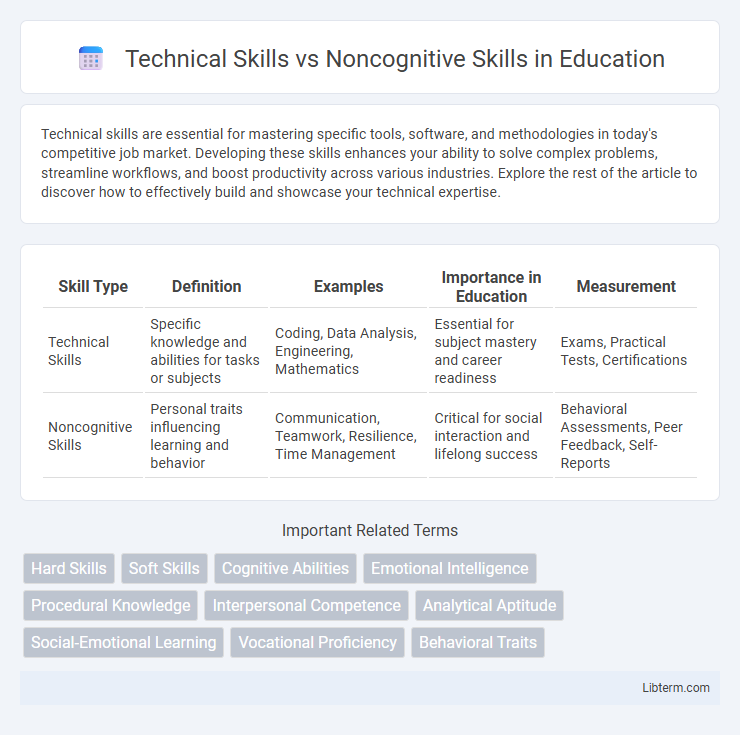Technical skills are essential for mastering specific tools, software, and methodologies in today's competitive job market. Developing these skills enhances your ability to solve complex problems, streamline workflows, and boost productivity across various industries. Explore the rest of the article to discover how to effectively build and showcase your technical expertise.
Table of Comparison
| Skill Type | Definition | Examples | Importance in Education | Measurement |
|---|---|---|---|---|
| Technical Skills | Specific knowledge and abilities for tasks or subjects | Coding, Data Analysis, Engineering, Mathematics | Essential for subject mastery and career readiness | Exams, Practical Tests, Certifications |
| Noncognitive Skills | Personal traits influencing learning and behavior | Communication, Teamwork, Resilience, Time Management | Critical for social interaction and lifelong success | Behavioral Assessments, Peer Feedback, Self-Reports |
Introduction to Technical and Noncognitive Skills
Technical skills encompass specific knowledge and abilities related to tasks, such as programming, data analysis, and machine operation, essential for job performance in various industries. Noncognitive skills, including communication, teamwork, adaptability, and problem-solving, influence personal behavior and social interaction, playing a critical role in workplace success. Understanding both skill sets is vital for comprehensive workforce development and effective career advancement strategies.
Defining Technical Skills
Technical skills refer to the specific abilities and knowledge required to perform tasks related to a particular field or job, including proficiency in software, tools, machinery, or programming languages. These skills are measurable, teachable, and often documented through certifications or degrees. Mastery of technical skills enables efficient problem-solving, precise task execution, and effective use of technology in professional settings.
Defining Noncognitive Skills
Noncognitive skills encompass emotional intelligence, resilience, motivation, and interpersonal abilities crucial for personal and professional success. Unlike technical skills, which involve specific knowledge and expertise in tasks or tools, noncognitive skills influence behavior, decision-making, and teamwork. Developing strong noncognitive skills enhances adaptability and leadership in dynamic work environments.
Key Differences Between Technical and Noncognitive Skills
Technical skills encompass specific, teachable abilities related to tasks like programming, data analysis, and machinery operation, essential for executing job functions. Noncognitive skills involve interpersonal traits and emotional intelligence, such as communication, adaptability, and teamwork, which influence workplace behavior and collaboration. The key difference lies in technical skills being measurable and job-specific, while noncognitive skills are more subjective and linked to personal attributes that enhance professional effectiveness.
Importance of Technical Skills in the Modern Workplace
Technical skills such as coding, data analysis, and digital literacy are critical for navigating the complexities of the modern workplace, enabling employees to efficiently operate specialized tools and software. Mastery of technical competencies drives innovation, supports automation, and enhances productivity across industries from technology to finance. Employers prioritize these skills to ensure their workforce can adapt to rapidly evolving technologies and maintain competitive advantage.
The Role of Noncognitive Skills in Career Success
Noncognitive skills such as emotional intelligence, resilience, and communication significantly enhance career success by fostering effective teamwork and leadership capabilities. Unlike technical skills, which are often job-specific and quantifiable, noncognitive skills contribute to adaptability and problem-solving in dynamic work environments. Employers increasingly prioritize these soft skills for long-term career growth and organizational impact.
Examples of Technical and Noncognitive Skills
Technical skills include proficiency in programming languages like Python, data analysis using Excel, and operating machinery such as CNC tools, highlighting measurable and specific expertise. Noncognitive skills encompass attributes like emotional intelligence, adaptability, teamwork, and time management, which influence personal interaction and workplace behavior. Employers prioritize technical skills for task execution, while noncognitive skills drive collaboration and problem-solving in dynamic work environments.
How to Assess Technical Versus Noncognitive Skills
Assessing technical skills involves practical evaluations such as coding tests, certifications, and hands-on projects that measure proficiency in specific tools or methodologies. Noncognitive skills, including emotional intelligence, teamwork, and adaptability, require observational assessments, behavioral interviews, and psychometric tests designed to gauge interpersonal abilities and mindset. Combining quantitative metrics for technical competencies with qualitative insights for noncognitive traits provides a comprehensive understanding of a candidate's or employee's overall effectiveness.
Integrating Both Skills for Professional Development
Integrating technical skills such as data analysis and software proficiency with noncognitive skills like communication, adaptability, and emotional intelligence is essential for comprehensive professional development. This balanced approach enhances problem-solving abilities and fosters effective teamwork, driving innovation and productivity in the workplace. Organizations increasingly prioritize employees who demonstrate both expertise and interpersonal skills to stay competitive in dynamic industries.
Future Trends: Balancing Technical and Noncognitive Skills
Future trends underscore the growing importance of balancing advanced technical skills such as AI programming and data analytics with noncognitive skills like emotional intelligence and adaptability. Employers increasingly seek professionals who can not only master complex technologies but also excel in communication, critical thinking, and collaboration to navigate dynamic work environments. This integration fosters innovation and resilience, essential for thriving in the evolving digital economy.
Technical Skills Infographic

 libterm.com
libterm.com